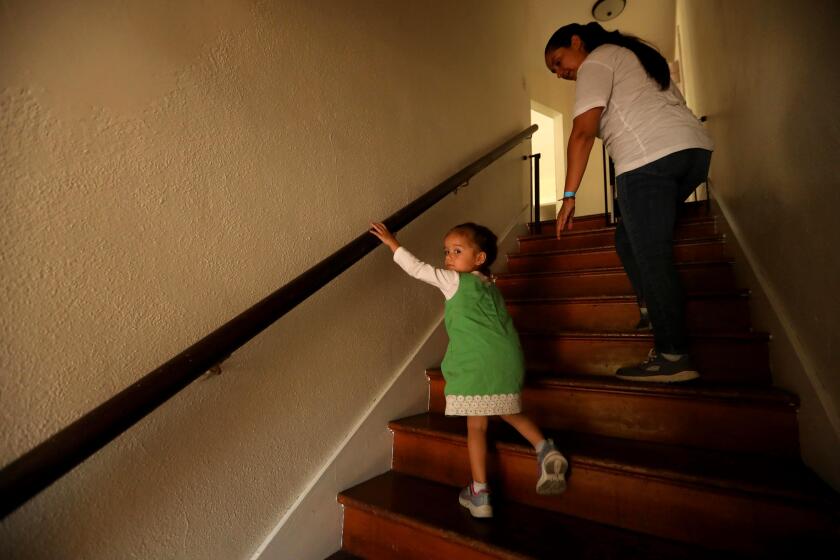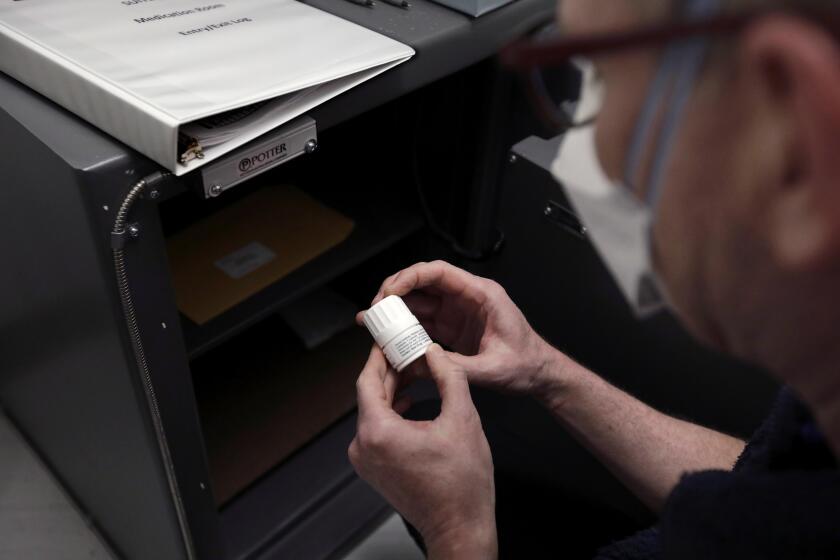Gov.’s stance an obstacle for spinach safety bills
Gov. Arnold Schwarzenegger has put a damper on hopes for legislation to protect consumers from lethal bacterial contamination of California-grown lettuce and spinach, saying he favors a voluntary, industry-run program to impose controls on growers.
In the wake of two major E. coli outbreaks last fall, state Sen. Dean Florez (D-Shafter) unveiled a trio of bills a month ago that would ban risky agricultural practices and require state health certification and inspection of farms growing leafy greens. California’s farm industry opposes the proposed legislation and instead plans to implement a marketing agreement in April aimed at establishing food-safety standards for the growers.
At the core of the debate is whether strong governmental action is needed to police a leafy greens industry that has repeatedly endangered public health or whether industry self-regulation can ensure the safety of its billion-dollar commodity and restore consumer confidence.
Since 1995, 22 E. coli outbreaks have been traced to lettuce and spinach, which are particularly susceptible to bacteria in soil, and in most cases the crops were grown in California. A nationwide outbreak last September sickened more than 200 people and killed three, including a toddler, who ate prepackaged spinach grown on a Salinas Valley farm. Two months later, more than 150 Taco Bell and Taco Johns customers in Northeastern states fell ill after eating tainted lettuce from the Central Valley and Salinas area.
Schwarzenegger’s aides said the governor had not decided whether he would veto the legislation. But they said he supports the industry-led program rather than a government-mandated approach and told Florez so in a private conversation last week.
Florez, whose district includes farm areas from Bakersfield to Fresno, said the industry’s agreement amounts to “the fox guarding the henhouse” and called leafy greens growers a “rogue industry” incapable of policing itself. But he is seeking a compromise with the industry, because he said the governor’s stance effectively kills the chances of his “California Produce Safety Action Plan” becoming law as originally written.
“I told him, ‘The next one won’t be on me, it’ll be on you,’ ” Florez said, suggesting to Schwarzenegger that if more people die in another E. coli outbreak linked to California crops, the governor could be blamed.
Sabrina Lockhart, a spokeswoman for the governor, said Schwarzenegger “prefers an industry-regulated solution, but his top priority is public safety.” He directed state agencies to help the industry “develop strict agricultural practices” for its new program.
“The agricultural industry has a long history of partnering with government to improve its practices. Right now the administration is focused on working with the industry for best practices,” she said, adding that the governor still hopes to work with Florez.
GOP state Sen. Abel Maldonado, chairman of the Senate Agricultural Committee and owner of a Santa Maria strawberry farm, also favors the industry program.
He “believes the industry can police itself, because they have a very vested interest in ensuring their product is safe. They are taking this very seriously,” said his spokeswoman Amy Thoma. Also, she said, the agreement will be implemented rapidly, while new laws wouldn’t go into effect until next year.
The spinach industry lost an estimated $100 million last fall when the Food and Drug Administration warned people to temporarily stop eating bagged spinach. About 900 California farms, most of them in the Salinas Valley, grow spinach and lettuce, which are worth $1.6 billion a year and account for about three-fourths of U.S. production.
On April 1, the state’s farm industry plans to implement an agreement in which firms that package, process or ship leafy greens will buy spinach and lettuce only from growers that meet a list of food safety standards.
So far, 51 of about 85 handlers -- representing 90% of leafy greens produced in California -- have signed up for the program. Their growers will be subject to inspections, and their spinach and lettuce will be labeled state certified.
The state Department of Food and Agriculture appointed a 14-member board --13 leafy greens handlers and one public member -- to develop and oversee the standards. The standards are not yet complete but may require irrigation water tests, treatment of compost and buffers between crops and cows, and prohibit use of raw manure.
Tim Chelling, a vice president of the Western Growers Assn., a top industry trade group that developed the agreement, said “everything is on the table right now” for possible legislation but added that the industry program may work so well that the issue will become moot.
“This marketing agreement is going forward, and it will be out in the field in April,” he said. “Almost everybody is signed up.”
The agreement is a “a first response” by the industry “but a very substantial approach,” Chelling said.
The industry board also plans to follow up with an order making the agreement mandatory for all spinach and lettuce handlers in the state.
“The marketing agreement is the first thing you can get up in a reasonably rapid fashion with a very substantial chunk of action involved. Legislation is not attractive, because it takes more time,” Chelling said.
But Florez said that until the industry program includes all handlers and growers, the public will not be not protected. He also wants the state health department, not the agriculture department, to enforce standards, because he considers agricultural officials too close to the industry and less familiar with health and bacteria issues.
“We’re not interested in fast,” he said. “We’re interested in safe. We want the Department of Health Services to hold all the growers to these standards.”
To seek support from the governor and industry, Florez is advocating creation of an agricultural commission of leafy greens handlers and public members -- similar to the Strawberry Commission -- to enforce standards under direction of the health agency. Growers’ participation would be mandatory, and the standards would be written into the state health code.
“We will absolutely run our bills, but let’s see how far we can get industry to go with a commission structure they can understand,” he said.
Florez plans to meet with farm industry representatives today. At a committee hearing Wednesday, he also questioned the diligence of the agriculture department in creating the board overseeing the industry agreement, saying some members have been sued or investigated for tainted produce.
U.S. and state officials implicated an unidentified San Benito County farm in the spinach outbreak, and the strain of E. coli was traced to an adjacent cow pasture. State health officials said Tuesday at a hearing that they will soon release a report revealing results of the inquiry.
More to Read
Get the L.A. Times Politics newsletter
Deeply reported insights into legislation, politics and policy from Sacramento, Washington and beyond. In your inbox three times per week.
You may occasionally receive promotional content from the Los Angeles Times.






